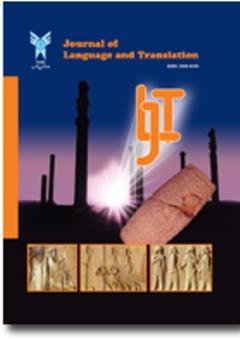Effect of Recall Protocol on Iranian Undergraduate University Students' General English Achievements: Examining the Role of Gender
Subject Areas : All areas of language and translationMahnaz Moayeri 1 , Mohammad Reza Khodareza 2 * , Valeh Valipour 3 , Ramin Rahimy 4
1 - Department of English Language, Tonekabon Branch, Islamic Azad University, Tonekabon, Iran
2 - Department of English Language, Tonekabon Branch, Islamic Azad University, Tonekabon, Iran
3 - Department of English Language, Tonekabon Branch, Islamic Azad University, Tonekabon, Iran
4 - Department of English Language, Tonekabon Branch, Islamic Azad University, Tonekabon
Keywords: Gender, General English achievement, Recall protocol,
Abstract :
The multifaceted roles of corrective feedback in second language instruction continue to attract the attention of both researchers and practitioners interested in how it can most effectively be integrated into classroom interaction in ways that benefit second language development (Tedick & Lyster, 2020). Therefore, the present study intends to shed a light on the effectiveness of recall protocol method on Iranian male and female intermediate EFL learners' general English achievements. To fulfill this study, 80 male and female undergraduate university students were divided randomly into two groups; The experimental group received recall protocol feedback method whereas the control group was taught through the conventional feedback techniques. Consequently, the results of the independent samples T-test revealed that the experimental group outperformed the control group. Moreover, the results of two-way ANOVA showed that male students obtained significantly higher scores than the female students considering the use of recall protocol. Furthermore, the pedagogical implications suggested that such findings can be colossal as a way for assist creating efficiency, especially on the off chance that the disclosures are to be utilized by L2 teachers.
Amalia, Z. D. H., Fauziati, E., & Marmanto, S. (2019). Male and female students’ preferences on the oral corrective feedback in English as a foreign lan-guage speaking classroom. Humanio-ra, 10 (1), 25-33.
Bartlett, F. C. (1932). Remembering. Cam-bridge: Cambridge MA.
Berkemeyer, V. C. (1989). Recall protocol data: Some classroom implications. Die Unterrichtspraxis, 21(3), 131-137.
Bernhardt, E. B. & James, C. (1987). The Teaching and Testing of Comprehen-sion in Foreign language Learning. University of Wisconsin at Madison. Retrieved form: https://files.eric.ed.gov/fulltext/ED285420.pdf
Bernhardt, E. B. & Deville, C. (1991). Test-ing in foreign language programs and testing programs in foreign language departments: Reflections and recom-mendations. In R. V. Teschner (Ed.), Issues in language program direction: Assessing foreign language proficien-cy of undergraduates (pp. 43-59). Boston, MA: Heinle & Heinle Pub-lishers, Inc.
Boyte, K. J. (2016). Foreign Language Teachers’ Attitudes Toward Written Recall Protocol as a Practice of Read-ing Comprehension Assessment. TESOL International Journal, 11(2), 108-132.
Brantmeier, C. (2006). The Effects of Lan-guage of Assessment and L2 Reading Performance on Advanced Readers’ Recall. The Reading Matrix, 6 (1), 1-17.
Brewer, D. D. (2000). Forgetting in the re-call-based elicitation of personal and social networks. Social Networks, 22, 29–43.
Brisbois, J. E. (1992). Do first language writing and second-language reading equal secondlanguage reading com-prehension? An assessment dilemma. Unpublished doctoral dissertation, The Ohio State University, Columbus, Ohio.
Chang, Y. (2006). On the use of the imme-diate recall task as a measure of sec-ond language reading comprehension. Language Testing, retrieve from
https://www.researchgate.net/publication/249870332_On_the_use_of_the_immedi-ate_recall_task_as_a_measure_of_second_language_reading_comprehension
Clarke, S. (2020). A Little Guide for Teach-ers: Formative Assessment. SAGE publications Ltd.
Gholizade, R. (2013). The Investigation of Differential Effects of Recast and Metalinguistic Feedback on Accuracy, Fluency, and Complexity of Speaking Performance of Male and Female EFL Learners. Journal of Novel Applied Sciences. 2(9), 417-428.
Guinness, K., Detrich, R., Keyworth, R. & States, J. (2020). Overview of Correc-tive Feedback. Oakland, CA: The Wing Institute. https://www.winginstitute.org/instructional-delivery-feedback
Guo, L. (2013). Effects of Recasts and Metalinguistic Feedback on Develop-ing ESL Learners’ Pragmatic Compe-tence. Ph.D. dissertation. University of Kansas.
Heinz, P. J. (2004). Towards enhanced sec-ond language reading comprehension assessment: Computerized versus manual scoring of written recall pro-tocols. Reading in a Foreign Lan-guage, 16(2).
Iraji, S., Zoghi, M., & Nemat-Tabrizi, A. (2014). Corrective Feedback and Learners' Uptake across Gender in an EFL Context. Procedia - Social and Behavioral Sciences (98), 680 – 687.
Lyster, R. (2016). The effects of corrective feedback on instructed L2 speech perception. Studies in Second Lan-guage Acquisition, 38(1), 35–64.
Jafarigohar, M. & Gharbavi, A. (2014). Re-cast or Prompt: Which One Does the Trick? Procedia - Social and Behav-ioral Sciences, 98, pp.695 – 703.
Packiam Alloway, T. & Gathercole, S. (2005). The role of sentence recall in reading and language skills of chil-dren with learning difficulties. Learn-ing and Individual Differences, 15(4), 271-282
Riley, G. L. & Lee, J. F. (1996). A compari-son of recall and summary protocols as measures of second language read-ing comprehension. Retrieved from: https://journals.sagepub.com/doi/1 0.1177/026553229601300203
Schmidt-Rinehart, B. C. (1994). The effects of topic familiarity on second-language listening comprehension. Modern Language Journal, 78, 179-189.
Tedick, D. J., & Lyster, R. (2020). Scaf-folding language development in im-mersion and dual languageclass-rooms. Routledge.
Ulrich-Verslycken,K., HajHamid, L., & Kaffafi Azar, F. (2021). Oral Correc-tive Feedback: A Synopsis for Teach-ers. Retrieved from: https://www.correctivefeedbackforteachers.com/blog/oral- corrective-feedback-a-synopsis-for eachers#: ~: text=Corrective%20feedback%20(CF)
%20is%20any, Oli-ver%20%26%20Adams%2C%202021).
Zhang, J., Cao, X., & Zheng, N. (2022). How Learners’ Corrective Feedback Beliefs Modulate Their Oral Accura-cy: A Comparative Study on High- and Low-Accuracy Learners of Chi-nese as a Second Language. Retrieved from: https://www.frontiersin.org/articles/10.3389/fpsyg.2022.869468/full.

